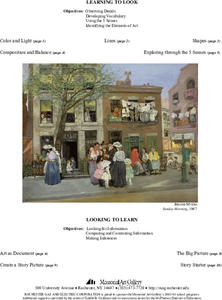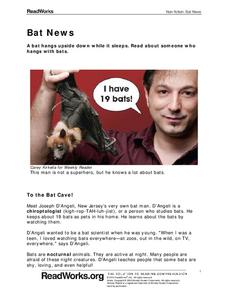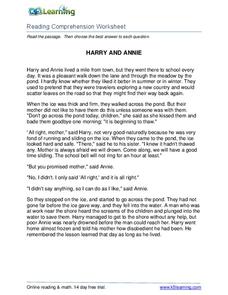Have Fun Teaching
Context Clues (5)
Unfamiliar words can make it difficult to understand what a piece of writing is trying to say. Practice using context clues to define words you don't know with a language arts worksheet, which features five sentences and enough space to...
Have Fun Teaching
Predict and Infer (22)
Encourage close reading and critical thinking with a worksheet that asks readers to select an event from a story, predict what they believe will happen, and list clues from the story that support this prediction. After completing...
Memorial Art Gallery
Learning to Look, Looking to Learn - Sunday Morning
Jerome Myers' depiction of the urban landscape in "Sunday Morning" is the focus of a series of activities that asks viewers to examine how an artist uses the elements of a painting to tell a story. The resource packet includes an...
Have Fun Teaching
Growing Seeds (9)
A seed, water, and sunlight. A seed, water, but no sunlight. A seed, sunlight, but no water. Young biologists are ask to infer what will happen to seeds given five different growing conditions.
Read Works
Bat News
Get the bat facts with a short nonfiction reading passage. After reading the passage, readers respond to questions that focus on main idea, inferencing, vocabulary in context, and author's purpose.
Curated OER
Reading Comprehension: Voice of Nature
Understanding a text can be a very interesting task. Fourth graders read a passage describing the origin of an Aboriginal myth. They answer 11 comprehension questions that require them to pull key details, use context, and think...
Great Books Foundation
On the Origin of Species
How did Charles Darwin support his controversial theory of evolution with evidence? Use an excerpt from his 1859 work On the Origin of Species to reinforce the importance of making inferences within an informational text, and to...
Great Books Foundation
The Road Not Taken
Every time you make a choice, it prevents another option from taking shape. Spend some time analyzing "The Road Not Taken" by Robert Frost with a reading activity that includes four discussion questions that recall evidence from the text.
K5 Learning
Harry and Annie
Henry and Annie are on thin ice—literally! Read about the siblings' winter walk and the importance of staying safe with a short passage and four follow-up questions.
K12 Reader
Little Women: Helping Father
Jo's decision to sell her hair to bringing her wounded father home is a pivotal and poignant scene from Louisa May Alcott's Little Women. Class members read the excerpt and answer four questions about the details, vocabulary, and plot...
August House
The Great Smelly, Slobbery, Small-Tooth Dog
Read the story The Great Smelly, Slobbery, Small-Tooth Dog: A Folktale from Great Britain by Margaret Read MacDonald and choose from multiple activities to learn about the tale's theme—kindness. With so many options, your kind kids will...
K5 Learning
Humming Birds
Seeing a hummingbird in the wild can be a magical experience. Learn more about these delicate members of the animal kingdom with a short reading passage, complete with four short-answer questions.
Curated OER
"Monsters Are Due on Maple Street" by Rod Serling
These questions ask learners to think about the text "Monsters Are Due on Maple Street" in a variety of ways. In addition to practicing reading comprehension, class members work on interpreting, making inferences and connections,...
Curated OER
Reading Comprehension 2: Level 10
Are you a friggatriskaidekaphobic? An excerpt from an article about the fear of Friday the 13th is used as the basis of a reading comprehension exercise. The five questions require readers to employ several strategies (drawing...
Curated OER
Reading Comprehension 4: Level 7
Make an impression with a reading comprehension assessment based on Claude Monet. After reading a short biographical paragraph about the famous French painter, readers demonstrate their comprehension skills by drawing inferences,...
Curated OER
Gus and Grandpa and the Two Wheeled Bike: comprehension skills
What a fantastic idea! Give these bookmarks to your readers to help them conquer pages 206-222 of Gus and Grandpa and the Two Wheeled Bike. They make inferences, conduct close reads, search for cause and effects, and focus...
Curated OER
"A Boy and a Man" from Banner in the Sky by James Ramsey Ullman
A great resource for chapter 2 of Banner in the Sky by James Ramsey Ullman, this worksheet asks learners to respond to a series of lower- and higher-level questions using complete sentences following a class discussion. Pupils are asked...
Curated OER
The True Confessions of Charlotte Doyle: Graphic Organizer
After completing the first five chapters of The True Confessions of Charlotte Doyle By Avi, use direct quotes to make inferences about how Charlotte feels about certain characters. Later, when the novel has concluded, revisit...
Curated OER
Sentence Completion: High-Intermediate Level
Learners can practice their reading strategies and comprehension skills with a sentence completion worksheet that comes with a detailed answer key. Whether you use the worksheet as an assessment or as a group or individual practice...
Polk Bros Foundation
I Can Infer Motive and Effects for an Action
Help your pupils determine just what makes a character or person tick by zooming in on one character or person. This graphic organizer is dedicated to analyzing one person and asks pupils to infer a personality trait, note down an action...
EngageNY
Mid-Unit Assessment: Close Reading of the "Spadefoot Toad"
A mid-unit assessment challenges scholars to use their close reading skills to identify the main idea and key details. After reading a brief excerpt, learners answer a series of questions—multiple-choice, short answer—complete a graphic...
Soft Schools
Onomatopoeia in Literature
Identifying onomatopoeia is one thing; making an inference about the significance of the sound is more advanced. Young poets read a literary passage and identify the examples of onomatopoeia in each before naming the...
California Education Partners
The Road Not Taken
An effective lesson plan truly can make all the difference. Seventh graders read, analyze, and annotate Robert Frost's "The Road Not Taken" before writing an essay about what they believe to be the theme of the iconic poem.
Curated OER
Tools of Persuasion
Ethos, pathos, and logos. After reading a passage about Aristotle's, three basic tools of persuasion, individuals answer a series of multiple choice comprehension questions and craft responses to three short-answer essay prompts.

























